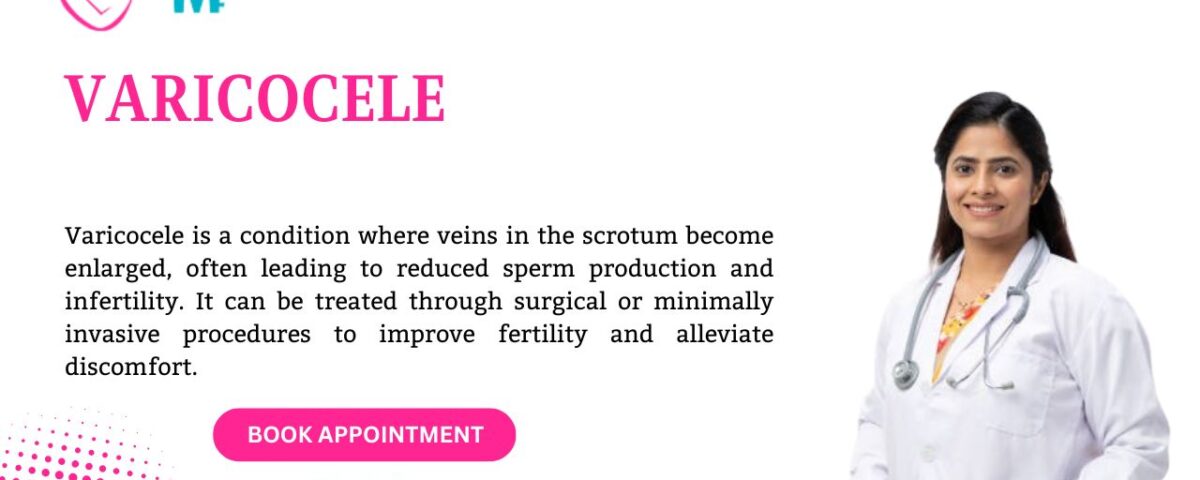IVF for HIV patients
January 10, 2025Guaranteed Donor IVF
January 10, 2025Varicocele, a prevalent yet often misunderstood condition, takes center stage in the realm of male reproductive health. Characterized by the abnormal enlargement of veins within the scrotum, varicocele can have significant implications for male fertility.
While it may present without noticeable symptoms, the condition’s impact on reproductive well-being is a cause for concern, prompting increased attention from both medical professionals and individuals aspiring to conceive.
In this brief overview, we embark on a journey to unravel the intricacies of varicocele, exploring its definition, potential causes, and the importance of early diagnosis and intervention.
Join us as we delve into the world of varicocele to gain a comprehensive understanding of its implications for male reproductive health.

What is Varicocele?
Varicocele is a condition characterized by the enlargement of veins within the scrotum, the pouch of skin that holds and protects the testicles. These enlarged veins resemble varicose veins in the legs and are sometimes referred to as a “bag of worms” because of how they look. Varicoceles can occur on either or both sides of the scrotum, albeit the left side is more likely to have the ailment.
Causes of Varicocele
Understanding the underlying causes of varicocele is essential in comprehending the condition’s impact on male fertility. Varicoceles usually develop when the valves within the veins that regulate blood flow fail to function correctly. This failure leads to blood pooling and increased pressure in the veins, resulting in their enlargement.
Several factors contribute to the development of varicocele, including:
- Genetic predisposition: Some individuals may have a genetic predisposition to weak vein valves, making them more susceptible to varicocele.
- Increased blood pressure in the veins: Conditions that cause increased pressure within the veins, such as prolonged standing or heavy lifting, can contribute to the development of varicocele.
- Hormonal factors: Hormonal imbalances, particularly those involving testosterone, may play a role in the development of varicocele.
Symptoms of Varicocele
Varicoceles often manifest without noticeable symptoms, making their detection challenging without a thorough examination. However, some individuals may experience:
- Dull pain or discomfort in the scrotum: This pain may intensify with prolonged standing or physical activity.
- Testicular atrophy: In some cases, varicocele can lead to the shrinkage of the affected testicle.
- Visible enlargement or swelling of the scrotum: The presence of dilated veins may be visible or palpable.
It’s crucial to note that the absence of symptoms does not negate the potential impact of varicocele on fertility, emphasizing the importance of medical evaluation for individuals trying to conceive.
Diagnosis of Varicocele
Varicocele is usually diagnosed by a combination of physical examination, review of medical history, and diagnostic testing. A medical professional may inquire about symptoms, visually evaluate the body, and palpate the scrotum to feel for any anomalies during a physical examination.
In Addition to the physical examination, the following diagnostic tests may be utilized:
Doppler ultrasound: This imaging test uses sound waves to create a real-time image of the blood flow within the scrotum. It is a non-invasive and highly effective method for diagnosing varicocele.
Thermography: In some cases, thermography, which measures heat patterns, may be used to identify increased blood flow associated with varicocele.
Varicocele and Male Fertility
One of the primary concerns associated with varicocele is its impact on male fertility. Research indicates that varicocele is a leading cause of male infertility, affecting sperm production and quality. The exact mechanisms through which varicocele influences fertility are still under investigation, but potential factors include:
- Increased testicular temperature: The pooling of blood in the dilated veins can elevate the temperature in the scrotum, adversely affecting sperm production and function.
- Hormonal imbalances: Varicocele may disrupt the hormonal environment necessary for normal sperm production.
Treatment Options for Varicocele
Treating varicocele is essential for those who want to increase their chances of getting pregnant or reduce symptoms related to it. Depending on the severity of the problem and personal health concerns, different treatment methods may be available. Typical methods include:
Observation: In cases where varicocele is asymptomatic and not significantly impacting fertility, a “watch and wait” approach may be recommended. Standard observing through actual assessments and, if vital, indicative tests can assist with evaluating any changes.
Varicocelectomy: This surgical procedure involves ligating or removing the dilated veins to restore normal blood flow. Varicocelectomy is often considered for individuals experiencing fertility issues associated with varicocele.
Assisted reproductive technologies (ART): For individuals facing severe infertility issues, ART such as IVF may be recommended to achieve pregnancy.
Lifestyle Modifications and Varicocele
Lifestyle modifications play a pivotal role in managing varicocele and promoting optimal reproductive health. Wearing supportive underwear or utilizing scrotal support devices can alleviate symptoms by reducing pressure on affected veins. Avoiding prolonged periods of sitting or standing helps mitigate factors that contribute to increased scrotal pressure. Furthermore, adopting a balanced diet rich in antioxidants and essential nutrients supports overall reproductive well-being. These simple yet effective lifestyle adjustments, coupled with medical interventions, empower individuals to take an active role in managing varicocele, fostering an environment conducive to improved fertility and enhanced overall health.
Varicocele and Emotional Well-being
Addressing the emotional aspects of varicocele is equally important, as the condition can significantly impact an individual’s mental and emotional well-being. The difficulties related to richness issues, combined with the vulnerability of treatment results, can prompt pressure, uneasiness, and misery.
Support networks, counseling services, and educational resources play a crucial role in helping individuals and couples navigate the emotional complexities of dealing with varicocele and infertility.
Conclusion
Varicocele, though common, is a nuanced condition with implications for male fertility. Understanding its causes, symptoms, diagnosis, and treatment options is paramount for individuals seeking to build their families. With advancements in medical science and a holistic approach to reproductive health, there is hope for those affected by varicocele to achieve their parenthood goals. By combining medical interventions, lifestyle modifications, and emotional support, individuals can embark on a journey towards improved fertility and overall well-being.
Frequently Asked Questions:-
What is the main cause of varicocele?
When the usual blood flow is disrupted, it results in the accumulation of blood, leading to the dilation or enlargement of veins. This occurrence is most frequently observed during puberty, a phase characterized by rapid testicular growth, requiring increased blood supply. Approximately 85% of cases manifest in the left testicular area.
How can I reduce varicocele?
Reducing varicocele involves lifestyle changes and medical interventions. Adopting a healthy lifestyle that includes regular exercise, maintaining a balanced diet, and avoiding excessive heat to the scrotum can contribute positively. In some circumstances, surgical techniques to correct dilated veins may be recommended. Seeking medical guidance is critical for a proper diagnosis and treatment plan. Early intervention and a proactive approach to overall well-being can significantly contribute to the reduction of varicocele symptoms and potential complications.
Can varicocele damage sperm?
Varicoceles, characterized by blocked and enlarged veins around the testes, have been associated with a decline in sperm count, reduced sperm motility, and an elevated presence of malformed sperm. The prevailing theory among experts posits that these varicoceles contribute to infertility by raising the temperature in the scrotum, consequently diminishing sperm production.
Can I have kids after varicocele surgery?
Varicocelectomy, a surgical procedure for the treatment of varicoceles, has been shown to enhance semen parameters in 60% to 70% of men, leading to pregnancy rates of up to 50%. Despite these positive outcomes, there is limited available data pinpointing prognostic factors that contribute to the success of achieving pregnancy after varix ligation.
Read Also:

